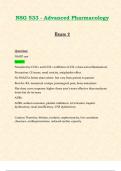NSG 533 - Advanced Pharmacology Exam 2 Question: NSAID use Answer: Nonselective COX -1 and COX -2 inhibitors (COX -2 does anti -inflammation) Precaution: GI issues, rena l toxicity, antiplatelet effect No NSAID is better than others - but vary from patient to patient Best for: RA, menst rual cramps, pos tsurgical pain, bony metastasis Flat-dose curve response: higher doses aren't more effective than moderate doses but do increase ADRs ADRS: sodium retention, platelet inhibition, GI irritation, hepatic dysfunction, renal insufficiency, CNS dysfunction Caution: Diuretics, lithium, warfarin, nephrotoxicity, low creatinine clearance, antihypertensives, reduced cardiac capacity Question: APAP Answer: Inhibit prostaglandin synthesis in CNS and block pain impulses in the periphery Indication: mild -moderate pain including low back pain and osteoarthritis Limits: hepatotoxicity don't go over 4000 mg/day, caution with alcohol use, binge drin king Renal dysfunction: 50 -75% dose reduction and for those with excessive ETOH use Question: Adjunctive pain medications Answer: Fibromyalgia: Duloxetine Diabetic peripheral nerve pain (DPN): duloxetine, pregabalin (lyrica) Post-herpetic neuralgia ( PHN) (shingles): gabapentin, pregabalin, lidocaine patch Question: Opioids Answer: Opioids act by stimulating opioid receptors in CNS ADRs: Sedation, hallucinations, constipation, nausea, vomiting, urinary retention, myoclonus, respiratory depression Question: Opioids ADR management Answer: Excessive sedation: reduce dose by 25% or change interval Constipation: docusate at bedtime or BID, senna, bisacodyl, miral ax, meth ylnaltrexone, naloxegol N/V: prevention: hydroxyzine, diphenhydramine, treatment : prochlorperazine, ondansetron Gastroparesis: metoclopramide Vertigo: meclizine Urticaria/itching: hydroxyzine, diphenhydramine Respiratory depression: mild: reduce by 25%, moderate -severe: naloxone CNS irritabilit y: d/c opioid, treat with benzo Patients with CYP450 may respond differently to opioids: drug unresponsivenes s - elevated toxic serum levels Tolerance to respiratory depression develops quickly Question: Opioid allergy Answer: Cross -sensitivity is unlikely patient is truly allergic to one chemical class within the opioid family such as morphine -like agents they may try a different one such as meperidine -like or methadone -like agents Mixed agonist/antagonist agents are treated as if they are morphine -like agents Question: Opioid conversion Answer: Opioid potency is compared using a reference standa rd of 10 mg parenteral morphine Current total daily dose is calculated (for 24 hours including any rescue dosages) and the total of the new dosage form is deter mined using a ratio of equianalges ic doses Sustained -release options may decrease by 25% due to oversedation concern Methadone is more potent than once believed and may need to be reduced after calculation as well as for elderly




